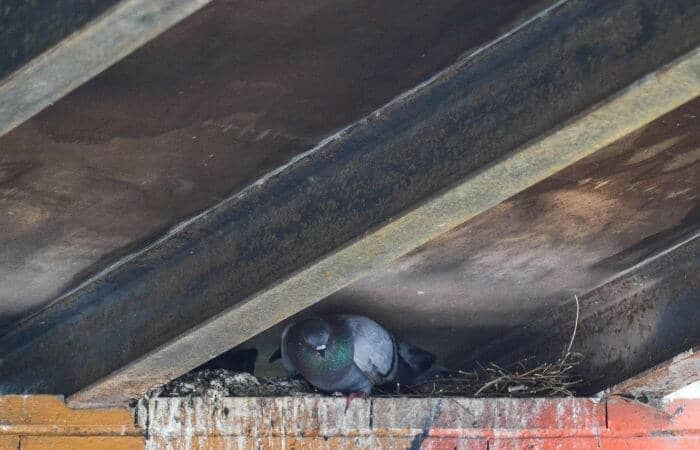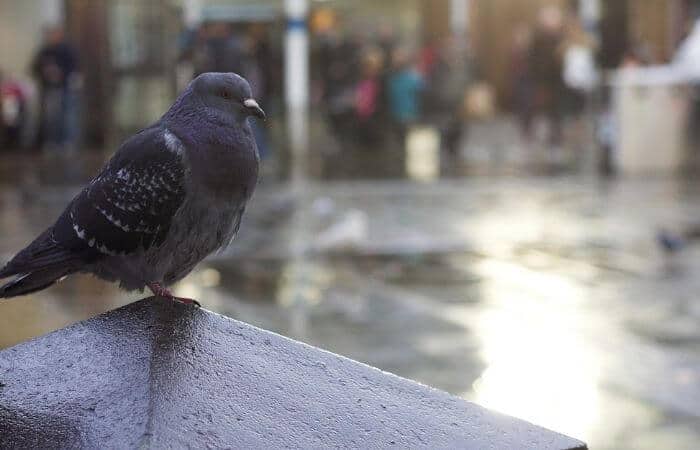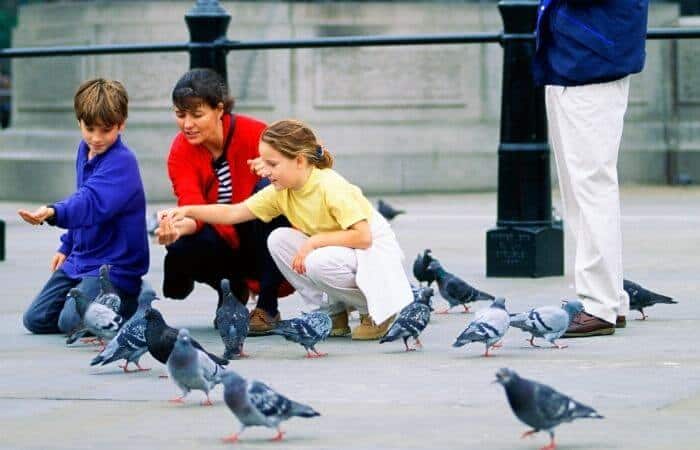Pigeons live in cities for the same reasons as humans.
There are places to live and find shelter, an abundant supply of food, and plenty of opportunity for social interaction and finding a mate.
Maybe the question should be why shouldn’t they live in cities? Cities have many advantages for these birds, but they aren’t the only avian species that have become urban dwellers.
Such birds as sparrows, tits, starlings, finches and members of the crow family, just to name a few, all live in our cities.
Yet the fact that pigeons flock together in large numbers makes them more prominent in people’s minds.
Pigeons have lived in our cities and towns for centuries. Mankind’s relationship with pigeons started way back in history.
They have been admired, bred for their beauty and also bred for food.
It is believed that they were the first avian species to live cheek by jowl with humans, so why do they live in cities?
1. Mans Relationship With Pigeons
Pigeons are believed to be the first wild bird species to become domesticated by man.
Whereas most animals will have a natural fear of humans, pigeons are intelligent and therefore curious.
This has created an interspecies relationship that has endured for centuries upon centuries.
2. Pigeon Nesting Habits
It is said that the first rock doves developed along the North African coast and spread around the Mediterranean Sea.
Their natural habit was the cliffs along the coastlines. Western man’s development started in what is now known as the Middle East.

As man developed, he constructed buildings. Buildings of importance were large and very ornate, incorporating elaborate designs and ornamentation.
They had many nooks and crannies to nest in.
You can imagine that these tall edifices resembled cliffs to pigeons.
The feral pigeons that nested and reproduced in these and the more common type of human accommodations passed on the sense of home and security to the succeeding generations.
Buildings were no longer strange and artificial structures.
3. Tied Relationship
The feral pigeons that we know today are originally descended from domesticated rock doves that mated with other wild birds.
They increased and spread at the same rate as humanity expanded. Where mankind settled in groups, so did pigeons.
Pigeons didn’t collectively decide to move into the cities recently, they have just simply followed man’s onward progress.

Like any child that was born in a city, the pigeon chick will call it home too.
4. Accommodation
Obviously, living in the cities is advantageous to pigeons, because we have never witnessed a mass migration of pigeons to the rural areas.
So, what do they get out of it?
One is an abundance of accommodation.
There are all sorts of structures to shelter and house pigeons, from simple garden sheds to elaborate skyscrapers.
In the inner city areas, where buildings are crammed together and many of the constructions are ornate or are architectural wonders that also provides plenty of scope for pigeons to safely nest or roost in.
5. Ample Resources
Cities are an endless source of food.
Most of our older and greatest cities also have expansive green areas.
On top of that there are trees and planters of bushes and flowers.

In the less commercial areas, housing and gardens, plus allotments can be found.
Add to that rooftop gardens and window boxes and you have a supply of natural bird feed.
But the most abundant source comes directly from humans. Millions upon millions of people have to eat every day.
They produce tons upon tons of food, some of which gets thrown away and some is simply dropped by accident or falls to the ground as debris.
Pigeons have learned to adapt to our fast food and throwaway society, on which they are thriving.
6. Safety and Security
It is also well known that cities are much warmer than open spaces in rural areas.
Even in the winter months built up areas retain more heat.
Buildings absorb warmth from heating systems during the day and release it at night, thus helping to keep pigeons warm during the cold winter months.
The residual heat from millions of vehicles also adds to the all-around temperatures in the cities.
During times of harsh weather when the temperatures drop, it rains or chill winds blow, there are plenty of shelters to find.
In Conclusion
Like us humans, anyone born and bred in one place will call it home.
It is the same for pigeons born in the city as it is for us.
Pigeons have adapted to city life ever since mankind has started to build them.
Of course, for the cultured pigeon, cities have the advantages of theatres, cinemas, art galleries, musical concerts, and the finest restaurants, especially the bins behind the restaurants.
